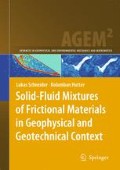Abstract
This chapter explains the complexity of the mixture theory that will be used in the remainder of the book. We focus attention on mixtures whose constituents exhibit a single temperature only and whose internal processes do not involve exchanges of interaction energies among the constituents. So, balance laws for the constituent masses and momenta are needed, but it suffices to deal only with the conservation law of energy for the mixture as a whole. This excludes changes of aggregation between constituents but still allows mass changes due to (restricted) chemical reactions, fragmentation and abrasion. We also assume that the internal exchanges of angular momenta are due to the moments of the exchanges of linear momenta only. This leads to symmetric partial stress tensors.
The constitutive postulates are motivated by taking single material bodies as a basis. We argue that, owing to the functional dependence of the partial densities on the true densities and volume fractions, the latter must be given by their own evolution equations, and that both true densities and volume fractions and their gradients ought to enter as independent constitutive variables. Mechanically, the constituent velocities, deformation gradients (via the left Cauchy-Green deformation tensors for isotropy), stretching and vorticity tensors are considered important for the description of the deformation and motion of the fluid and solid constituents as are thermodynamically the empirical temperature, its time rate of change and spatial gradient.
Classical hypo-plasticity is introduced as an evolution equation for the Cauchy stress tensor, by equating an objective time derivative of T to a symmetric tensor-valued production term, which is an additive decomposition of linear and non-linear terms, which, in turn, are functions of the stress itself and the stretching. Since such an evolution equation is difficult to handle in a thermodynamic analysis, we propose to introduce for the description of the frictional processes an objective evolution equation for a symmetric stress-like tensor variable that may also serve as an independent constitutive variable. In Chapter 8 it will be shown to yield hypo-plasticity.
Further restrictive assumptions are the constancy of the true constituent density for a ‘density-preserving’ component and the saturation condition, according to which all constituents fill the entire geometric space of the mixture.
Access this chapter
Tax calculation will be finalised at checkout
Purchases are for personal use only
Preview
Unable to display preview. Download preview PDF.
Author information
Authors and Affiliations
Corresponding author
Editor information
Editors and Affiliations
Rights and permissions
Copyright information
© 2009 Springer-Verlag Berlin Heidelberg
About this chapter
Cite this chapter
Schneider, L., Hutter, K. (2009). Constitutive Assumptions. In: Schneider, L., Hutter, K. (eds) Solid-Fluid Mixtures of Frictional Materials in Geophysical and Geotechnical Context. Advances in Geophysical and Environmental Mechanics and Mathematics. Springer, Berlin, Heidelberg. https://doi.org/10.1007/978-3-642-02968-4_4
Download citation
DOI: https://doi.org/10.1007/978-3-642-02968-4_4
Published:
Publisher Name: Springer, Berlin, Heidelberg
Print ISBN: 978-3-642-02967-7
Online ISBN: 978-3-642-02968-4
eBook Packages: Earth and Environmental ScienceEarth and Environmental Science (R0)

